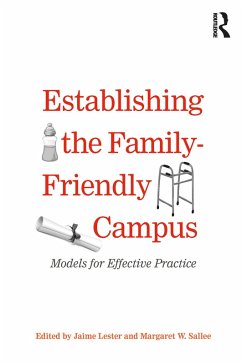The impact of changing demographics in higher education, and the importance of family-friendly policies, is well documented. There is an urgent need to keep PhDs in the higher education sector, to recruit talented scholars into academia, and retain them over the course of their academic careers. The key is instituting policies to enable all constituencies to balance work and personal responsibilities.This book covers the range of issues faced by all generations in academe, from PhD students, to the "sandwich generation" (those caring for children and aging parents simultaneously) through to older faculty and administrators. It addresses the causes for women faculty with children leaving the academy at a disproportionately higher rate than men, the conflicts women face between academic work and motherhood, and the difficulties they encounter in reentering the academy after having left the professoriate. In examining the need for family-friendly policies, this book documents the "best practices" currently in use at institutions across the United States. Each chapter highlights practices and programs from a variety of institutions and institutional types that address the needs of a more inclusive family-friendly campus and offers suggestions to others who are implementing similar change on their campuses. These examples provide context so that readers no longer have to develop practices in isolation, and without evidence of their effectiveness.The editors suggest that the most successful campuses are those that utilize a work-life systems framework to meet the needs of its employees. They also point to future growth trends, including expanding the focus from faculty and staff to incorporate all in the campus communityThis book offers guidance to department chairs, deans, faculty, administrators, and graduate students on setting a family-friendly agenda, and models for implementation.Contributors include: Emily Arms -- Kathleen Beauchesne -- Jill Bickett -- Sharon A. Dannels -- Mariko Dawson Zare -- Karie Frasch -- Marc Goulden -- Jeni Hart -- Caryn Jung -- Jaime Lester -- Sharon A. McDade -- Jean McLaughlin -- Mary Ann Mason -- Sharon Page-Medrich -- Kate Quinn -- Margaret Sallee -- Randi Shapiro -- Angelica Stacy -- David L. Swihart -- Gloria D. Thomas -- Darci Thompson
Dieser Download kann aus rechtlichen Gründen nur mit Rechnungsadresse in A, B, BG, CY, CZ, D, DK, EW, E, FIN, F, GR, HR, H, IRL, I, LT, L, LR, M, NL, PL, P, R, S, SLO, SK ausgeliefert werden.

